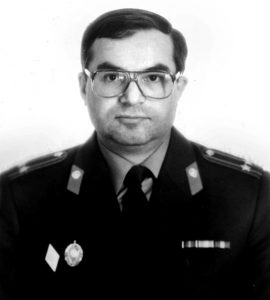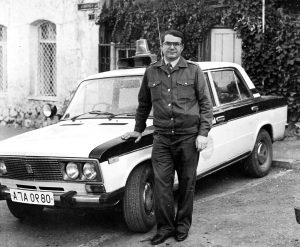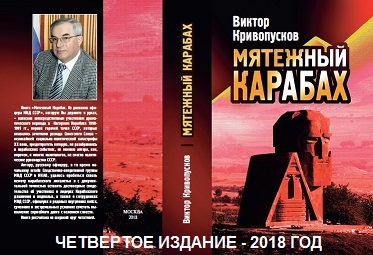Full in Russian (полностью на русском) – https://aga-tribunal.info/krivopuskov_baku/
The book of Victor Vladimirovich Krivopuskov “Rebellious Karabakh” is well known. The first edition was in 2003. The text of the second edition in 2007 was published on the ArmenianHouse.org website. After the second was the third edition in 2013, and then the fourth in 2018 (on the anniversary of the author). However the book all these 17 years was in Russian and Armenian. There is a need of translation in English.
Below we present just few quotes from one of the chapters of his book, translated by “AGA-Tribunal”. We plan to update and add more texts in English.
Victor Krivopuskov is a Russian officer, lieutenant colonel, at that time (1988-90) the chief of staff of the Investigation and operational Group of the USSR Ministry of Internal Affairs in the Nagorno-Karabakh Autonomous region (oblast) of the Azerbaijani SSR, and now president of the Russian Society for friendship and cooperation with Armenia, doctor of sociology, laureate of the literary prize named after Boris Polevoy. He was not only an eyewitness to those many events, but, of course, he is well aware of their content, performers, culprits and inspirers.
From the chapter
“About the events in Baku on January 20, 1990. One year later”

… They (Azerbaijanis) tried not to talk about the mass pogroms and killings of Armenians, as well as the deaths of Soviet soldiers and officers, the Russian population at the hands of Azerbaijani nationalists and other “uncomfortable” details.
… By the number of victims, the duration and scale of the pogroms (in Azerbaijan), especially by their consequences in Soviet reality, they had no equal.
…
But the events in Baku, knowing the true truth about them, plunge into a moral trance. In a generalized form, the stories of eyewitnesses of the January events indicated not only their non randomness in the series of nationalist anti-Armenian confrontations, but also indicated the preparedness of the opposition for the armed anti-Soviet constitutional coup in Azerbaijan, its true ideologists and organizers and the untimely measures taken by the USSR leadership to prevent them.
The facts testified that all of 1989, the so-called democratic opposition “was tempered” in creating an unstable situation in Baku and in the republic as a whole, moving from hidden single acts of terror of the Armenian population to the organizational design and centralized management of their nationalist movement.
… The origins of so called Popular Front of Azerbaijan (PFA) were emissaries of Turkish and other special services. Their activity was especially intensified after eight hundred kilometers of the Soviet border with Iran were destroyed by rampant crowds of Azerbaijanis on the night of January 1, 1990. To Azerbaijan, and through it to other regions of the USSR, a stream of weapons, anti-Soviet provocative literature, replicating equipment, and communications poured uncontrollably. On the eve of the Baku events, thousands of people crossed the border in both directions. There is no doubt that the supply of extremist groups of the Popular Front with everything necessary for an armed coup went through this channel.
With the help of Turkish pan-Turkist organizations (the “Musavat” Nationalist Party, the “Turan” People’s Democratic Party, the Azerbaijani culture and Kars culture Society, the “Gray wolves” terrorist extremist and neo-fascist organization, the National movement party and others), a network of nationalist agents spread across the territory of the Republic of Azerbaijan. Their activity in fanning extremism in the republic resembled the program and slogans of Azerbaijani nationalists of 1918-1920: “Death to the Armenians”, “Azerbaijan for Azerbaijanis”, “Union with fraternal Turkey”, “For Great Turan”. The largest cities of Baku, Sumgait, Mingechaur were divided into regions for organizing provocations, riots, pogroms, and resisting to law enforcement bodies and troops. The scenarios of the Sumgayit and subsequent events were used to train new ranks of thugs.
Another important detail was noted: the bearers and implementers of the ideas of Islamic independence in Azerbaijan were ones who came from Nakhichevan, as well as from among the refugees from Armenia, representatives of one influential nomenclature of the Azerbaijani clan. The leadership of the Popular Front has actually become their performer.

(to be continued)

One thought on “Victor Krivopuskov: about the events and crimes in Baku in 1990”